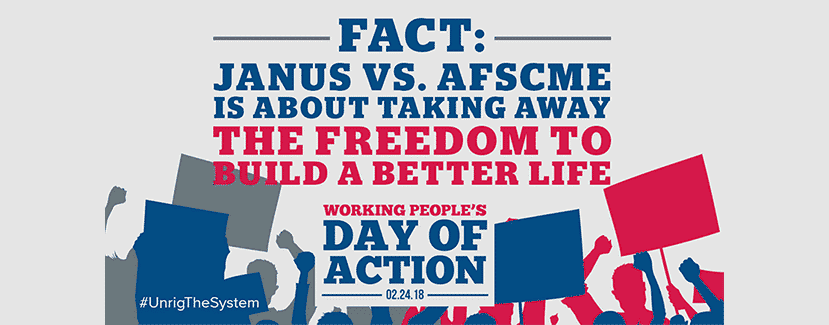The Fight for Public Sector Unions Is a Fight for Our Freedom

When the Supreme Court hears arguments in the case Janus v. AFSCME on February 26th, it will essentially consider “right to work” legislation for public sector workers across the nation. At question is whether those who choose not to join their workplace union should pay a “fair share” fee for the work the union still carries out on their behalf: collective bargaining, contract administration, and managing grievances, among other things. The Supreme Court unanimously upheld payment of “fair share” fees 41 years ago in Abood v. Detroit Board of Education. The decision affirmed that public sector union shops are legal and that workers should pay their “fair share” of the costs associated with a union representing their financial interests.
Be clear: This case is not just an attack public sector workers.
The first responders who showed up on Valentine’s Day in response to the 18th school shooting this year, with expertise and well-honed skills born of training and too many tragedies, are public sector workers. The teachers who educate our nation, health professionals who provide medical care across the spectrum, uniformed officers who protect us, office staff who work behind the scenes to make sure our government runs effectively—these are public sector workers and their work is critical to the freedoms we enjoy. These are our neighbors, friends and family members who stand to lose under the Janus v. AFSCME case. When they lose, we lose.
The attack on public sector workers is particularly devastating for minorities; it hurts black workers in particular, an impact that has its roots in our nation’s labor and racial history. According to Barret Holmes Pitner’s article in the Daily Beast, “right to work” policies began in Texas in the 1930s as a response by wealthy industrialists to successful union organizing across races. The industrialists squashed this union activity by using Jim Crow laws to end organizing between white and black workers and by passing “right to work” laws that were economically devastating for unions. It is not surprising that the 10 other Confederate States followed, becoming the first to pass “right to work” laws. Public sector union jobs continue to be a path to social mobility for black workers, other minorities and women, and so we should continue expect these unrelenting attacks. Race has always been used to maintain our rigged economic system.
Organizing in union offers us many freedoms: Think of the freedom to attend a parent-teacher conference or to take off work when a loved one is sick without fear of losing our jobs or pay for the day. Or the freedom to choose where to live because high-quality public schools are available to all communities, not just to those who are wealthy. Or the freedom to retire with dignity. Everyone deserves these freedoms and strong unions are key to securing them for all workers.
Despite the attacks, unions are moving policies at the bargaining table and in political arenas that benefit entire communities. According to an Economic Policy Institute report, “non-union workers benefit from a strong union presence in the labor market.” We see how union leadership reaches beyond the workplace to policy wins that benefit everyone. The union-driven Fight for $15 campaign will result in 17% of Americans living in a jurisdiction with a $15 per hour minimum wage by 2021. Nearly 43 million workers will have access to paid sick days and paid family and medical leave due to local and state wins—victories that are the direct result of collaborations among advocates, community groups, and unions. Collective bargaining wins have reduced class size for teachers, created safer nurse staffing levels in hospitals and maintained strong building codes in construction. Unions bargain for the common good to lift up and improve our society. It is for these reasons that Janus is a tremendous threat to our way of life, whether you belong to a union or not.
By Carol Joyner, director of Labor Project for Working Families.